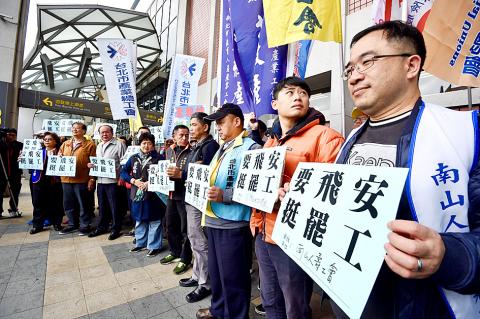About 150 people from 60 labor unions nationwide yesterday rallied outside Taipei International Airport (Songshan airport) in solidarity with an ongoing strike by China Airlines Ltd (中華航空) pilots, voicing their opposition to legislation that would require workers to give employers advanced warning of a strike.
Chanting “we want flight safety” and “we support the strike,” participants gathered outside the airport before marching to the Civil Aeronautics Administration building, where they shouted words of encouragement to members of the Taoyuan Union of Pilots, who were collecting pilots’ licenses for the nearby strike.
China Airlines pilots launched the strike on Friday during the Lunar New Year holiday, demanding that the company reduce their work hours, increase bonuses, replace poor-performing managers and ban retaliation against union members.

Photo: Peter Lo, Taipei Times
As of yesterday, the number of pilots who joined the strike rose to more than 600, the union said.
“We cannot stand the way in which China Airlines and other people have unfairly portrayed the strike as an attempt to blackmail the company by holding passengers hostage,” Taipei City Confederation of Trade Unions executive director Chen Shu-lun (陳淑綸) said.
The strike was “single-handedly caused by the company” after it ignored the union’s warning of a pending walkout, she said.
Before that, the pilots had attempted to negotiate with the company for nearly a year, she added.
“Seeing the amount of resistance that the union is facing during this strike, we can only imagine how much more difficult it would be for even less-advantaged workers to launch a strike,” she said, adding that the fight for better work conditions is universal.
The unions that took part in the rally covered a wide range of industries and sectors, including transportation, banking, nursing, cleaning services, electronics manufacturing and the media, and come from various regions of Taiwan, she said.
“We will continue to ask more people to join us in supporting the strike,” she said.
Although China Airlines complies with the Aircraft Flight Operation Regulations (航空器飛航作業管理規則), there is still room for improvement, she said.
“We don’t want the lowest-acceptable work conditions; we want decent work conditions,” she said.
Since Friday, several government officials and legislators have advocated for legislation that would require workers to give employers advance notice of a pending strike, confederation chairwoman Cheng Ya-hui (鄭雅慧) said.
“What they are saying is nonsense. The legal procedures for strikes are already extremely complex and difficult,” she said.
The pilots were able to launch the strike because they had been planning to do so since the Mid-Autumn Festival last year, she said.
Through this strike, the pilots of the Taoyuan Union of Pilots hope not only to improve their own working conditions, but also to encourage more workers to fight against overwork, union member Chen Chien-tsai (陳建財) said.
“We hope to see more workers unionize and help us put an end to Taiwan’s reputation as the island of overwork,” he said. “That is the kind of significance we really hope to create.”

Right-wing political scientist Laura Fernandez on Sunday won Costa Rica’s presidential election by a landslide, after promising to crack down on rising violence linked to the cocaine trade. Fernandez’s nearest rival, economist Alvaro Ramos, conceded defeat as results showed the ruling party far exceeding the threshold of 40 percent needed to avoid a runoff. With 94 percent of polling stations counted, the political heir of outgoing Costa Rican President Rodrigo Chaves had captured 48.3 percent of the vote compared with Ramos’ 33.4 percent, the Supreme Electoral Tribunal said. As soon as the first results were announced, members of Fernandez’s Sovereign People’s Party

EMERGING FIELDS: The Chinese president said that the two countries would explore cooperation in green technology, the digital economy and artificial intelligence Chinese President Xi Jinping (習近平) yesterday called for an “equal and orderly multipolar world” in the face of “unilateral bullying,” in an apparent jab at the US. Xi was speaking during talks in Beijing with Uruguayan President Yamandu Orsi, the first South American leader to visit China since US special forces captured then-Venezuelan president Nicolas Maduro last month — an operation that Beijing condemned as a violation of sovereignty. Orsi follows a slew of leaders to have visited China seeking to boost ties with the world’s second-largest economy to hedge against US President Donald Trump’s increasingly unpredictable administration. “The international situation is fraught

MORE RESPONSIBILITY: Draftees would be expected to fight alongside professional soldiers, likely requiring the transformation of some training brigades into combat units The armed forces are to start incorporating new conscripts into combined arms brigades this year to enhance combat readiness, the Executive Yuan’s latest policy report said. The new policy would affect Taiwanese men entering the military for their compulsory service, which was extended to one year under reforms by then-president Tsai Ing-wen (蔡英文) in 2022. The conscripts would be trained to operate machine guns, uncrewed aerial vehicles, anti-tank guided missile launchers and Stinger air defense systems, the report said, adding that the basic training would be lengthened to eight weeks. After basic training, conscripts would be sorted into infantry battalions that would take

GROWING AMBITIONS: The scale and tempo of the operations show that the Strait has become the core theater for China to expand its security interests, the report said Chinese military aircraft incursions around Taiwan have surged nearly 15-fold over the past five years, according to a report released yesterday by the Democratic Progressive Party’s (DPP) Department of China Affairs. Sorties in the Taiwan Strait were previously irregular, totaling 380 in 2020, but have since evolved into routine operations, the report showed. “This demonstrates that the Taiwan Strait has become both the starting point and testing ground for Beijing’s expansionist ambitions,” it said. Driven by military expansionism, China is systematically pursuing actions aimed at altering the regional “status quo,” the department said, adding that Taiwan represents the most critical link in China’s